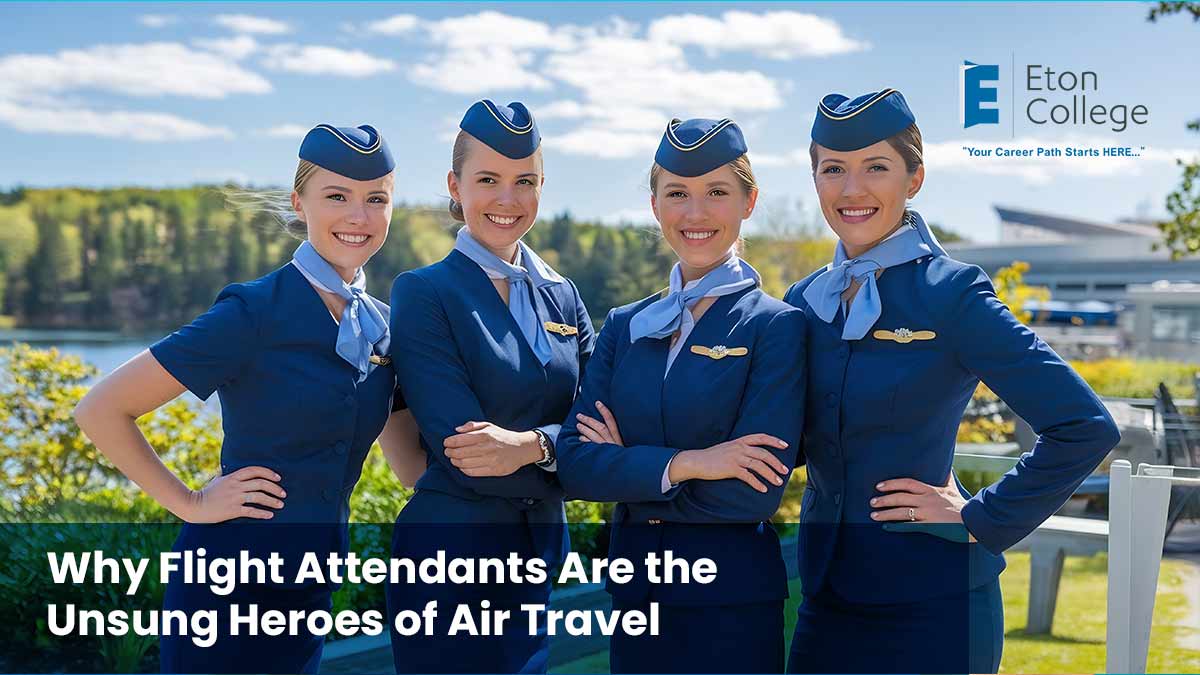Key Takeaways:
- The importance of flight attendants is more than just about being a service provider but a servicing professional upholding the safety and comfort of air travel passengers.
- Cabin crew members hold critical responsibilities. These can include handling emergencies and dispensing medications. Their role is as vital to smooth air travel as it is to safe air travel.
- Airline attendants are highly trained to sharpen their empathy and practice top professionalism. They are empowered with great emotional intelligence and technical expertise so they can perform in complex and difficult situations.
- This blog post also includes frequently asked questions about the role of flight attendants. You can learn more about jobs, skills, and cabin crew responsibilities.
The face of air travel is the in-flight crew, ensuring that every passenger enjoys a safe journey. The visible roles of the in-flight crew may include greeting passengers and serving meals, but their role is much more defined than these functions.
One of the crucial cabin crew responsibilities is to handle emergencies such as administering first aid and leading passengers to adhere to all the safety protocols initiated. Cabin crew would help an old passenger find the right seat or escort a flight full of passengers through turbulence.
The importance of flight attendants is also underscored in creating an atmosphere of inclusiveness and understanding onboard. They do this by assisting passengers with disabilities, families with young children, or non-native speakers, thereby making everyone feel welcome. The role requires patience, adaptability, and a genuine passion for helping others, further cementing their position as the unsung heroes of air travel.
Importance of Safety in Air Travel
At the heart of a flight attendant’s job is safety. Cabin crew check up the equipment before every flight to make sure everything works properly and that the cabin is secure. Rules include seatbelts during flights and proper stowing of luggage.
Furthermore, flight attendants perform safety pre-flight demonstrations at the beginning of every flight to educate passengers on proper emergency procedures. They also check the cabin during the flight for safety concerns such as seatbelts fastened during turbulence or in cases of suspicious activities which are handled discreetly.
Their training is brought to the fore in emergencies. They guide evacuation procedures, administer medical care, and give clear instructions to passengers. Their ability to stay calm under pressure can make the difference between chaos and order during critical moments.
Empathy and Emotional Intelligence in High-Stress Situations
A flight attendant is not just a safety professional; she is also an empathetic caregiver. From calming the nervous flyer to solving conflicts between passengers, their emotional intelligence gets tested every day.
They can interpret situations, bring comfort to passengers, and are professional in extremely difficult situations. Such skill of reaching out to any member of humankind makes them of great value to the airline as much as to its passengers.
Their empathizing ability is not only for passengers; even colleagues benefit from it. Working under such pressure requires teamwork to be united for those long hours. So, the emotional support of so many colleagues even uplifts a flight attendant, thus creating a collaborative work atmosphere.
The Extensive Training Behind the Role
Becoming a flight attendant takes more than just a passion for traveling. Intensive training programs cost millions of dollars in training programs that prepare the cabin crew for every foreseeable eventuality for airlines.
Training generally includes:
Emergency Procedures: Any procedures in the event of in-flight fires, medical emergencies, or evacuations.
From CPR to allergic reactions, mastering various medical emergencies through first aid means good care for passengers during flights with attentive flight attendants.
Customer Service Skills: Developing techniques to handle passenger needs elegantly and efficiently.
Cultural Sensitivity: Learning what it means to engage with people of other cultural backgrounds.
Teamwork and Coordination: A good team with adequate communication between crew members to have a smooth experience.
This overall training only stresses the importance of flight attendants and how critical their roles are. It ensures that they are well prepared to deal with varied situations confidently and humbly enough to contribute greatly toward ensuring the safety and satisfaction of passengers.
Cabin Crew as Ambassadors of the Airline
Often, the first impression a customer gets of the airline is of the flight attendant. Personality, professionalism, and service can reflect the values embodied in the airline’s brand promise.
One of the vital cabin crew responsibilities is to help build customer loyalty by creating memorable experiences and setting the airline apart in a competitive industry. Their ability to leave a lasting positive impression makes them key players in the success of the airline.
Flight attendants are also cultural ambassadors since they interact with travelers from diverse parts of the world. The ability to read between the cultural lines and the capacity to personalize services raise the delight in traveling. Such cultural savvy will, therefore, leave a trail of smiles for the carrier and good impressions of taking care.
FAQs on Flight Attendant Jobs and Training
- What are the principal responsibilities of a flight attendant?
Flight attendants look after passenger safety and offer great customer service besides handling flight emergencies.
- How do flight attendants react to emergencies?
These are trained professionals who would exercise the same calmness and precision while responding to medical emergencies, turbulence, or evacuation-related events.
- What skills are required to become an air host/air hostess?
Yes, essential skills include communication, teamwork, cultural sensitivity, and emotional intelligence.
- How long does flight attendant training take to complete?
It ranges between six weeks to three months. That usually depends on the curriculum in most of the airlines.
- Is a customer service background necessary?
Customer service experience is often not necessary, but it does help in the handling of the passenger.
- What is the function of a flight attendant?
They form a crucial interface between the security protocols and the passenger experience to ensure a secure and efficient flight for all.
Ode to Air Traffic Traffic Control’s Unsung Heroes
Flight attendants are the heart of the aviation industry: balancing technical knowledge with emotional service, they ensure that passengers get an experience during the entire trip, but feel safe first. We appreciate the hardworking efforts of flight attendants at Eton College and try to better prepare tomorrow’s cabin crew. To those who aspire to be considered among them, our programs will give them the skills and confidence with which to soar.




